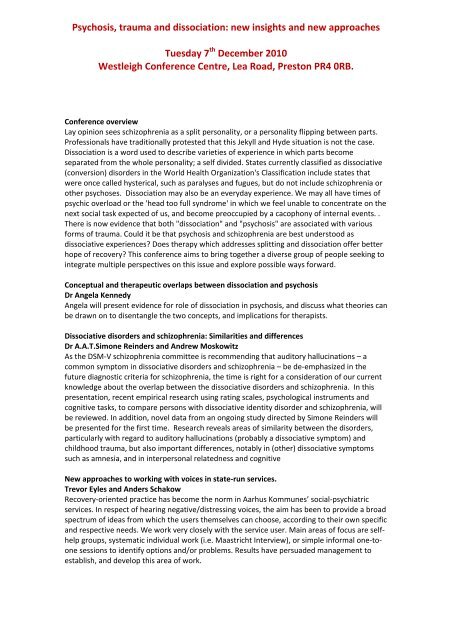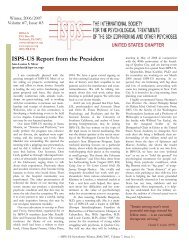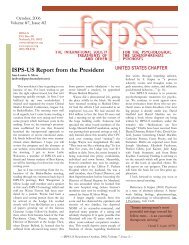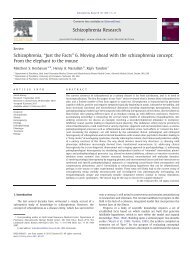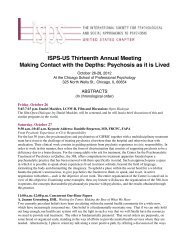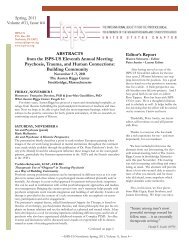Psychosis, trauma and dissociation new insights and new ... - ISPS-US
Psychosis, trauma and dissociation new insights and new ... - ISPS-US
Psychosis, trauma and dissociation new insights and new ... - ISPS-US
You also want an ePaper? Increase the reach of your titles
YUMPU automatically turns print PDFs into web optimized ePapers that Google loves.
<strong>Psychosis</strong>, <strong>trauma</strong> <strong>and</strong> <strong>dissociation</strong>: <strong>new</strong> <strong>insights</strong> <strong>and</strong> <strong>new</strong> approachesTuesday 7 th December 2010Westleigh Conference Centre, Lea Road, Preston PR4 0RB.Conference overviewLay opinion sees schizophrenia as a split personality, or a personality flipping between parts.Professionals have traditionally protested that this Jekyll <strong>and</strong> Hyde situation is not the case.Dissociation is a word used to describe varieties of experience in which parts becomeseparated from the whole personality; a self divided. States currently classified as dissociative(conversion) disorders in the World Health Organization's Classification include states thatwere once called hysterical, such as paralyses <strong>and</strong> fugues, but do not include schizophrenia orother psychoses. Dissociation may also be an everyday experience. We may all have times ofpsychic overload or the 'head too full syndrome' in which we feel unable to concentrate on thenext social task expected of us, <strong>and</strong> become preoccupied by a cacophony of internal events. .There is now evidence that both "<strong>dissociation</strong>" <strong>and</strong> "psychosis" are associated with variousforms of <strong>trauma</strong>. Could it be that psychosis <strong>and</strong> schizophrenia are best understood asdissociative experiences? Does therapy which addresses splitting <strong>and</strong> <strong>dissociation</strong> offer betterhope of recovery? This conference aims to bring together a diverse group of people seeking tointegrate multiple perspectives on this issue <strong>and</strong> explore possible ways forward.Conceptual <strong>and</strong> therapeutic overlaps between <strong>dissociation</strong> <strong>and</strong> psychosisDr Angela KennedyAngela will present evidence for role of <strong>dissociation</strong> in psychosis, <strong>and</strong> discuss what theories canbe drawn on to disentangle the two concepts, <strong>and</strong> implications for therapists.Dissociative disorders <strong>and</strong> schizophrenia: Similarities <strong>and</strong> differencesDr A.A.T.Simone Reinders <strong>and</strong> Andrew MoskowitzAs the DSM‐V schizophrenia committee is recommending that auditory hallucinations – acommon symptom in dissociative disorders <strong>and</strong> schizophrenia – be de‐emphasized in thefuture diagnostic criteria for schizophrenia, the time is right for a consideration of our currentknowledge about the overlap between the dissociative disorders <strong>and</strong> schizophrenia. In thispresentation, recent empirical research using rating scales, psychological instruments <strong>and</strong>cognitive tasks, to compare persons with dissociative identity disorder <strong>and</strong> schizophrenia, willbe reviewed. In addition, novel data from an ongoing study directed by Simone Reinders willbe presented for the first time. Research reveals areas of similarity between the disorders,particularly with regard to auditory hallucinations (probably a dissociative symptom) <strong>and</strong>childhood <strong>trauma</strong>, but also important differences, notably in (other) dissociative symptomssuch as amnesia, <strong>and</strong> in interpersonal relatedness <strong>and</strong> cognitiveNew approaches to working with voices in state‐run services.Trevor Eyles <strong>and</strong> Anders SchakowRecovery‐oriented practice has become the norm in Aarhus Kommunes’ social‐psychiatricservices. In respect of hearing negative/distressing voices, the aim has been to provide a broadspectrum of ideas from which the users themselves can choose, according to their own specific<strong>and</strong> respective needs. We work very closely with the service user. Main areas of focus are selfhelpgroups, systematic individual work (i.e. Maastricht Interview), or simple informal one‐toonesessions to identify options <strong>and</strong>/or problems. Results have persuaded management toestablish, <strong>and</strong> develop this area of work.


